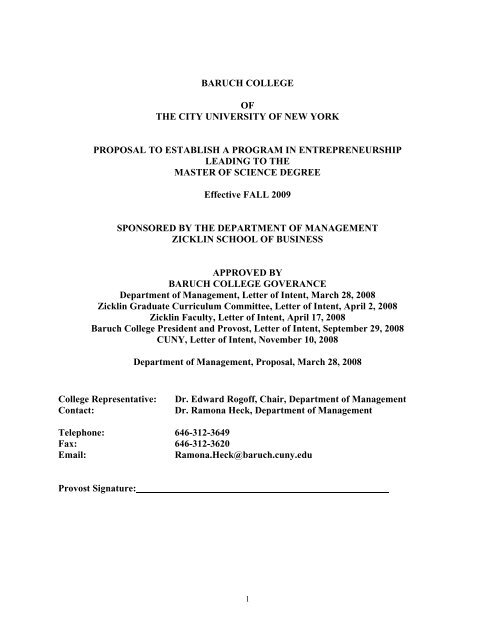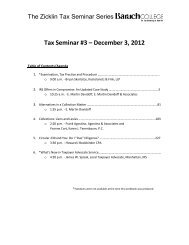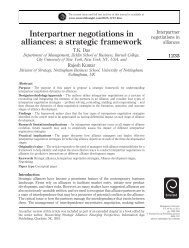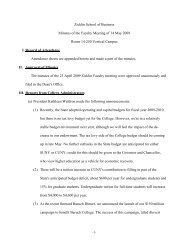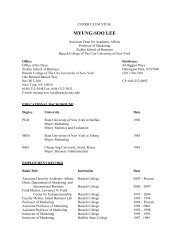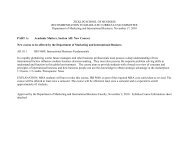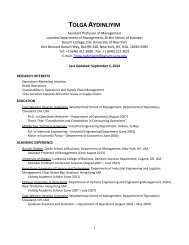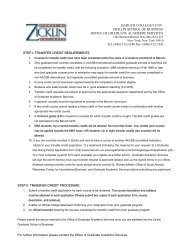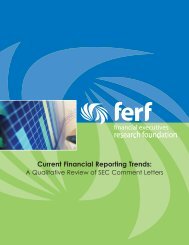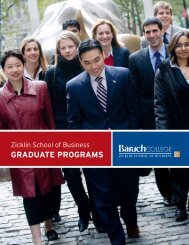BARUCH COLLEGE - zicklin : school of business - CUNY
BARUCH COLLEGE - zicklin : school of business - CUNY
BARUCH COLLEGE - zicklin : school of business - CUNY
- No tags were found...
You also want an ePaper? Increase the reach of your titles
YUMPU automatically turns print PDFs into web optimized ePapers that Google loves.
<strong>BARUCH</strong> <strong>COLLEGE</strong><br />
OF<br />
THE CITY UNIVERSITY OF NEW YORK<br />
PROPOSAL TO ESTABLISH A PROGRAM IN ENTREPRENEURSHIP<br />
LEADING TO THE<br />
MASTER OF SCIENCE DEGREE<br />
Effective FALL 2009<br />
SPONSORED BY THE DEPARTMENT OF MANAGEMENT<br />
ZICKLIN SCHOOL OF BUSINESS<br />
APPROVED BY<br />
<strong>BARUCH</strong> <strong>COLLEGE</strong> GOVERANCE<br />
Department <strong>of</strong> Management, Letter <strong>of</strong> Intent, March 28, 2008<br />
Zicklin Graduate Curriculum Committee, Letter <strong>of</strong> Intent, April 2, 2008<br />
Zicklin Faculty, Letter <strong>of</strong> Intent, April 17, 2008<br />
Baruch College President and Provost, Letter <strong>of</strong> Intent, September 29, 2008<br />
<strong>CUNY</strong>, Letter <strong>of</strong> Intent, November 10, 2008<br />
Department <strong>of</strong> Management, Proposal, March 28, 2008<br />
College Representative:<br />
Contact:<br />
Dr. Edward Rog<strong>of</strong>f, Chair, Department <strong>of</strong> Management<br />
Dr. Ramona Heck, Department <strong>of</strong> Management<br />
Telephone: 646-312-3649<br />
Fax: 646-312-3620<br />
Email:<br />
Ramona.Heck@baruch.cuny.edu<br />
Provost Signature: ___________________________________________________<br />
1
<strong>BARUCH</strong> <strong>COLLEGE</strong><br />
CITY UNIVERSITY OF NEW YORK<br />
PROPOSAL TO ESTABLISH A PROGRAM IN ENTREPRENEURSHIP<br />
LEADING TO THE<br />
MASTER OF SCIENCE DEGREE<br />
TABLE OF CONTENTS<br />
TITLE PAGE...................................................................................................................................................1<br />
TABLE OF CONTENTS ................................................................................................................................2<br />
ABSTRACT ....................................................................................................................................................3<br />
PURPOSE AND GOALS................................................................................................................................4<br />
NEED AND JUSTIFICATION.......................................................................................................................6<br />
STUDENTS.....................................................................................................................................................8<br />
A. Interest/Demand..................................................................................................................................9<br />
B. Enrollment Projections .....................................................................................................................12<br />
C. Admission Requirements..................................................................................................................13<br />
CURRICULUM ............................................................................................................................................13<br />
COST ASSESMENT.....................................................................................................................................17<br />
A. Faculty ..............................................................................................................................................17<br />
B. Facilities and Equipment ..................................................................................................................20<br />
C. Library and Instructional Materials....................................................................................................20<br />
D. Budget ...............................................................................................................................................20<br />
EVALUATION .............................................................................................................................................23<br />
APPENDICES<br />
APPENDIX A: LIST OF MS IN ENTREPRENEURSHIP PROGRAMS IN U.S. .....................................27<br />
APPENDIX B: COURSE DESCRIPTIONS FOR REQUIRED COURSES ...............................................36<br />
APPENDIX C: PROGRAM REQUIREMENTS (SED Format) .................................................................43<br />
APPENDIX D: SAMPLE PROGRAM SCHEDULING (SED Format) .....................................................47<br />
APPENDIX E: FACULTY TEACHING ASSIGNMENTS (SED Format) ................................................50<br />
APPENDIX F: PROJECTED EXPENDITURES (SED Form) ...................................................................57<br />
APPENDIX G: PROJECTED REVENUE (SED Form) .............................................................................59<br />
APPENDIX H: PROJECTED CAPITAL EXPENDITURE (SED Form) ...................................................61<br />
APPENDIX I: FACULTY CURRICULA VITAE.......................................................................................63<br />
APPENDIX J: LETTERS OF SUPPORT ....................................................................................................78<br />
APPENDIX K: EVALUATION REPORTS ................................................................................................84<br />
2
<strong>BARUCH</strong> <strong>COLLEGE</strong><br />
CITY UNIVERSITY OF NEW YORK<br />
PROPOSAL TO ESTABLISH A PROGRAM IN ENTREPRENEURSHIP<br />
LEADING TO THE<br />
MASTER OF SCIENCE DEGREE<br />
ABSTRACT<br />
Baruch College proposes to <strong>of</strong>fer a new degree program: Master <strong>of</strong> Science (MS) in Entrepreneurship. A vital<br />
aspect <strong>of</strong> our economy engages Entrepreneurship which <strong>of</strong>fers numerous <strong>business</strong> opportunities as well as income<br />
and wealth for diverse groups within our population, especially in the New York City metropolitan area. This<br />
proposed MS in Entrepreneurship, relative to the city market’s potential, can place Baruch College as a major player<br />
for new Entrepreneurship students and builds upon, yet augments, our existing MBA and BBA, with existing faculty<br />
and resources. Research suggests that about one third <strong>of</strong> the population consists <strong>of</strong> “nascent” entrepreneurs and 10<br />
percent currently own <strong>business</strong>es. Both nascent and current entrepreneurs desire and need advanced education and<br />
could be better served with this proposed MS degree which is appropriate given its shorter duration and lower costs.<br />
Students will engage in a concentrated program designed to meet the needs <strong>of</strong> those who have backgrounds in<br />
entrepreneurial ventures, are part <strong>of</strong> family <strong>business</strong>es, or are interested in starting their own <strong>business</strong>es. The<br />
program is interdisciplinary and <strong>of</strong>fers courses in management, human resources management, marketing, finance,<br />
and law as well as <strong>of</strong>fers students: internship opportunities; assistance with <strong>business</strong> start-ups, access to the Baruch<br />
College Entrepreneurship Competition (BCEC); student clubs; and other related programs/networks. The<br />
curriculum will prepare students with the technical training, skills and encouragement to become entrepreneurs in<br />
their own right. Whatever <strong>business</strong> or industry they choose to pursue, graduates <strong>of</strong> the program will be excellently<br />
situated to begin successful careers and/or new and regenerated ventures in the Entrepreneurship arena.<br />
3
PURPOSE AND GOALS<br />
Baruch College proposes to <strong>of</strong>fer a new degree program: Master <strong>of</strong> Science (MS) in Entrepreneurship. Increasing<br />
numbers <strong>of</strong> institutions and <strong>business</strong> scholars around the world are turning their attention to the study <strong>of</strong><br />
Entrepreneurship. In addition, Entrepreneurship is increasingly recognized by <strong>business</strong> <strong>school</strong>s internationally as<br />
one <strong>of</strong> the most dynamic, important, and widely applicable segments <strong>of</strong> <strong>business</strong> education. Moreover,<br />
Entrepreneurship permeates our economy and accounts for a majority <strong>of</strong> our national Gross Domestic Product and<br />
the wealth in the US. Entrepreneurship is a major aspect <strong>of</strong> our economy that <strong>of</strong>fers many <strong>business</strong> opportunities as<br />
well as income and wealth accumulation for diverse groups within our population, especially in the greater New<br />
York City metropolitan area. However, graduate level training <strong>of</strong> technical and managerial skills in<br />
Entrepreneurship can be obtained only by those who can afford the high tuition fees associated with an MBA in<br />
Entrepreneurship as currently <strong>of</strong>fered at Baruch College and other local institutions. In addition, there is no public<br />
or private institution <strong>of</strong> higher education in the New York area that <strong>of</strong>fers entrepreneurship-specific education in the<br />
form <strong>of</strong> an MS in Entrepreneurship.<br />
Since its launch in 1993, the Lawrence N. Field Center for Entrepreneurship at Baruch College has been one <strong>of</strong> the<br />
great successes <strong>of</strong> the City University <strong>of</strong> New York (<strong>CUNY</strong>) system. What began with just one course and one<br />
faculty member has grown into a full-fledged program with seven tenure-track and tenured faculty<br />
members/positions, including three endowed chairs. In 2008, the Lawrence N. Field Center for Entrepreneurship<br />
have become an endowed Program -- the Lawrence N. Field Programs in Entrepreneurship -- that conducts research,<br />
<strong>of</strong>fers undergraduate and graduate curriculum including BBA and MBA degrees, and also serves more than 1,000<br />
small <strong>business</strong> clients annually. First, we engage in a wide-ranging research and publication agenda; our minority<br />
entrepreneurship research is unique within the Entrepreneurship field <strong>of</strong> study and has gained national prominence<br />
and recognition. We have recently received the 2008 Award for Exceptional Contribution to Entrepreneurship<br />
Research from the Global Consortium for Entrepreneurship Centers. Second, with almost 500 enrolled students in<br />
undergraduate and graduate majors, the Lawrence N. Field Programs in Entrepreneurship have also recently<br />
received national recognition via a joint survey by Entrepreneur magazine and The Princeton Review ranked Baruch<br />
College 18 th among undergraduate entrepreneurial colleges in the nation in 2006. In 2008, our graduate academic<br />
program has been ranked within the top 25 programs by this same ranking survey. And third, we <strong>of</strong>fer an array <strong>of</strong><br />
counseling/consulting and training services via the Lawrence N. Field Center (now part <strong>of</strong> the overall Field<br />
Programs) which includes our highly ranked and award winning SBDC, along with a strong local networking<br />
environment. Local, regional and national conferences, workshops, trainings, and lectures are regularly <strong>of</strong>fered.<br />
From its beginnings to now, the Lawrence N. Field Programs in Entrepreneurship has been making great strides in<br />
establishing itself as a national and international leader in the study <strong>of</strong> Entrepreneurship. The Zicklin School <strong>of</strong><br />
Business has recruited several outstanding Entrepreneurship pr<strong>of</strong>essors and the Lawrence N. Field Programs in<br />
Entrepreneurship are internationally-renowned recognized for their excellence in this area. Baruch College’s<br />
4
Entrepreneurship programs are unique within <strong>CUNY</strong>, positioning Baruch College at the forefront <strong>of</strong> this growing<br />
and vibrant field <strong>of</strong> study.<br />
We envision this new MS in Entrepreneurship augmenting effectively our current MBA in<br />
Management/Entrepreneurship and Small Business Management. In fact, all the required course choices within its<br />
proposed major are being currently taught within our existing MBA, either as a required course or as electives.<br />
Some students simply prefer the MBA degree due to its higher status in the marketplace and their desire to complete<br />
a graduate degree with greater breadth. In contrast, this proposed MS in Entrepreneurship consists <strong>of</strong> 10 courses (5<br />
required and 5 electives) or 30 credits (15 required and 15 elective) as opposed to the 57 credits for our MBA. Thus,<br />
we do not expect any significant shift <strong>of</strong> current MBA students to the new <strong>of</strong>fering.<br />
This MS in Entrepreneurship is similar to the other seven MS degree programs at Baruch College, for example, the<br />
MS in Marketing and the MS in Real Estate. MS programs are designed for students who seek a concentrated focus<br />
on a particular subject area and in this case Entrepreneurship. Overall, this new proposed MS in Entrepreneurship<br />
will increase our course enrollments with both MBA and MS students in the same classroom when appropriate and<br />
as experienced by other MS programs in Marketing and Real Estate. This proposed MS moves us forward in our<br />
graduate programming per our recent external review <strong>of</strong> the Entrepreneurship program here at Baruch College.<br />
Finally, we believe that this proposed MS in Entrepreneurship, in the context <strong>of</strong> the New York City market’s<br />
potential, can place Baruch College as a major player for new Entrepreneurship students.<br />
The training <strong>of</strong>fered by the MS in Entrepreneurship program will enable graduates to develop the skills needed to<br />
build and sustain successful careers in Entrepreneurship--an important outcome for the New York metropolitan<br />
region’s economy. This program will provide students with advanced core skills in Entrepreneurship as well as the<br />
required training in the management, operation, growth and continuation <strong>of</strong> entrepreneurial firms. We will<br />
demonstrate in the next section that student demand for the MS in Entrepreneurship is very high, especially in the<br />
greater New York area, because there is currently no existing MS in Entrepreneurship degree <strong>of</strong>fered by any public<br />
or private institutions <strong>of</strong> higher education. Therefore, there are currently no skill-focused programs for those<br />
interested in developing concentrated knowledge in the area <strong>of</strong> entrepreneurship through participation in a shorter,<br />
less costly program. The establishment <strong>of</strong> such a program at Baruch College can further advance our ties with<br />
leaders in the entrepreneurial <strong>business</strong> community in New York and around the nation. Moreover, members <strong>of</strong> these<br />
<strong>business</strong> communities have been consulted in the development <strong>of</strong> this program proposal and have expressed great<br />
enthusiasm and support for this proposed program. See Appendix J for a list <strong>of</strong> supporters and their supporting<br />
letters and Appendix H for the evaluation by an external academic reviewer.<br />
Given the expertise and pr<strong>of</strong>essionalism <strong>of</strong> Baruch College’s current faculty members, the interest <strong>of</strong> the student<br />
population in the proposed degree program, the support <strong>of</strong> the industry and <strong>of</strong> the Lawrence N. Field Programs in<br />
Entrepreneurship -- established by <strong>CUNY</strong> at Baruch College to <strong>of</strong>fer Entrepreneurship programs and promote policy<br />
5
debates in the New York area--and the current scarcity <strong>of</strong> graduate-level Entrepreneurship programs in the nation<br />
that are both affordable and academically strong, Baruch College’s MS in Entrepreneurship program is in the<br />
position to rise to national recognition. The MS in Entrepreneurship is well-suited to Baruch College’s mission, to<br />
the College’s potential student population, to its stakeholders, and to its resources to develop and maintain a<br />
nationally-ranked program that both provides for an identifiable population and brings further recognition to the<br />
institution.<br />
NEED AND JUSTIFICATION<br />
Demand for students with an MS degree in Entrepreneurship originates from all industries. Startups now require<br />
advanced knowledge in many subject matter areas as well as technical product knowledge. The changing nature <strong>of</strong><br />
the economy demands more sophisticated analyses and the ability to work with people in the financial and<br />
investment sectors (such as investment banks, mortgage securities brokers, and investment trusts) as well as a<br />
variety <strong>of</strong> venture capitalists. Successful candidates looking to pursue cutting-edge <strong>business</strong> ventures in these<br />
current conditions must develop (or at least understand) a cadre <strong>of</strong> expertise including finance, marketing, and<br />
management, to name a few. Even traditional avenues in the Entrepreneurship sector (such as dot.coms, consulting,<br />
and buying and regenerating an existing <strong>business</strong>) have evolved and now require founders/owners to employ<br />
sophisticated analytical tools in their daily activities.<br />
To substantiate this need, we gathered information on similar MS programs currently <strong>of</strong>fered within the US, paying<br />
particular attention to universities and colleges in New York City and the greater region. Our first finding is that<br />
currently, there is no public or private institution <strong>of</strong> higher education in the New York area that <strong>of</strong>fers<br />
entrepreneurship-specific education in the form <strong>of</strong> an MS in Entrepreneurship.<br />
Nationwide, we surveyed six universities that <strong>of</strong>fer high-quality MS in Entrepreneurship programs: University <strong>of</strong><br />
Florida; Southern Methodist University – Cox; University <strong>of</strong> South Florida; Western Carolina University;<br />
Northeastern University; and University <strong>of</strong> Texas at Dallas. For each university, we gathered information on the<br />
program title, length <strong>of</strong> program, enrollment, tuition, program design, courses <strong>of</strong>fered, and the <strong>school</strong> or college<br />
within that particular university that <strong>of</strong>fers this Masters program. We first searched the website <strong>of</strong> each university<br />
for basic information about its Entrepreneurship program. When there were deficiencies, we attempted to search<br />
further via the department, faculty members or student websites for additional information. The general information<br />
on these programs is summarized in Table A-1 <strong>of</strong> Appendix A. More specific information on each program’s design<br />
and courses <strong>of</strong>fered is summarized in Tables A-2 and A-3 <strong>of</strong> Appendix A.<br />
6
The comparative information reported in Table A-1 clearly shows that the demand for Entrepreneurship education at<br />
the MS level is strong. In the New York area and the surrounding states, Baruch College’s new MS in<br />
Entrepreneurship will be a unique <strong>of</strong>fering although Northeastern University does have a one-year program but<br />
enrollment figures could not be obtained. The MS in Entrepreneurship programs at University <strong>of</strong> Florida and SMU<br />
by their respective <strong>school</strong>s <strong>of</strong> <strong>business</strong>, have healthy enrollment levels with similar course credit levels.<br />
Regionally, the Lawrence N. Field Programs in Entrepreneurship have many local contacts among academics and<br />
local <strong>business</strong> enterprise and both suggest that there is great industry demand for an MS program in<br />
Entrepreneurship. At this moment, pr<strong>of</strong>essional entrepreneurial opportunities <strong>of</strong>ten draw on graduates from basic<br />
finance, marketing, and management programs to create, manage and grow ventures that could be better handled by<br />
graduates trained in skills technically and subject matter-specific to the field <strong>of</strong> Entrepreneurship. Several industry<br />
supporters and other academics have encouraged Baruch College to establish an MS in Entrepreneurship degree<br />
because currently they see a void in the economy and marketplace for graduates with an academic Entrepreneurship<br />
background. These supporting letters are included in Appendices J and K.<br />
Currently, MS in Entrepreneurship training in the New York area is nonexistent and in the Northeast area is limited.<br />
Nationally, these programs are available only to those who are able to pay high tuition fees, such as University <strong>of</strong><br />
Florida and SMU-Cox (see Table A-1). Clearly, high quality Entrepreneurship education in the form <strong>of</strong> an MS<br />
graduate level is not available to the general public in the greater New York area. Baruch College has the ability to<br />
meet the needs <strong>of</strong> these New York residents by developing an MS program in Entrepreneurship. Importantly, the<br />
College can expect to benefit from this new MS program which will strengthen the College’s ties with the regional<br />
Entrepreneurship community.<br />
Primarily, students who complete the MS in Entrepreneurship will possess all the skills and knowledge necessary to<br />
start and grow a <strong>business</strong>. Many are anticipated to already own a <strong>business</strong> or have a specific start-up idea. For still<br />
other students, there are entry-level management positions in Entrepreneurship, a rapidly growing field. The MS in<br />
Entrepreneurship delivers not only core <strong>business</strong> skills, but also emphasizes knowledge that is specific to the<br />
entrepreneur. This combination <strong>of</strong>fers students numerous <strong>business</strong> opportunities for their own self-made<br />
employment and careers. Secondarily, the strong core <strong>business</strong> training and specific Entrepreneurship knowledge<br />
will equip graduates for many varied and lucrative positions: entrepreneurship development firms, appraisal and<br />
consulting firms, accounting firms, insurance companies, pension funds, banks and financial institutions, investment<br />
banks, entrepreneurship investment trusts, mortgage security brokers, commingled entrepreneurship funds,<br />
regulatory agencies, and firms with large entrepreneurship holdings. These positions require not only general<br />
<strong>business</strong> knowledge and management skills, but also knowledge and technical training specific to the<br />
Entrepreneurship field. The MS degree in Entrepreneurship proposed by Baruch College is positioned to provide<br />
this type <strong>of</strong> education. We have garnered supporting letters (included in Appendices J and K) from Baruch alumni,<br />
7
community <strong>business</strong> owners, organizers and leaders which address the <strong>business</strong>/employment opportunities this new<br />
MS in Entrepreneurship will <strong>of</strong>fer students.<br />
The MS in Entrepreneurship program is an advantageous and attractive step in the context <strong>of</strong> the Zicklin School <strong>of</strong><br />
Business’s efforts to establish a nationally renowned Entrepreneurship program. By facilitating faculty research<br />
opportunities, as well as cooperation and collaboration with key <strong>business</strong> leaders, the Entrepreneurship program is<br />
the heart <strong>of</strong> Baruch College’s plans to strengthen its reputation and pr<strong>of</strong>ile as a leader in <strong>business</strong> education and<br />
scholarship in Entrepreneurship. The establishment <strong>of</strong> an MS in Entrepreneurship program will attract additional<br />
national attention to the Entrepreneurship program and help the Zicklin School <strong>of</strong> Business be recognized as a leader<br />
in this field. The Zicklin School <strong>of</strong> Business and Baruch College have long been dedicated to the goal <strong>of</strong> creating<br />
nationally recognized Entrepreneurship programs with significant impact on the Entrepreneurship industry in the<br />
New York metropolitan area. Vital to that goal is the development <strong>of</strong> rigorous programs <strong>of</strong> graduate study in<br />
Entrepreneurship. Thus, the creation <strong>of</strong> the MS degree in Entrepreneurship will help the College and the School to<br />
achieve this goal.<br />
STUDENTS<br />
This proposed MS in Entrepreneurship is appropriate for various student populations and a number <strong>of</strong> situations,<br />
particularly given its shorter duration and lower costs. Research suggests that about one third <strong>of</strong> the population is<br />
continually engaged in “nascent” entrepreneurial behaviors and about 10 percent <strong>of</strong> the U.S. population currently<br />
own <strong>business</strong>es. Both nascent and current entrepreneurs desire and need advanced education and could be better<br />
served with this proposed MS degree. Further, some U.S. students already have an MBA in another subject –matter<br />
area but wish to complete additional in-depth course work as a second graduate degree. Some international students<br />
already have a foreign graduate degree but wish to complete a U.S. graduate degree. Additionally, this proposed<br />
MS in Entrepreneurship is a synergistic addition to the six international locations (such as Taiwan) where other<br />
Baruch College MS degree programs are currently being administered through the International Programs Office.<br />
Students <strong>of</strong> the proposed MS in Entrepreneurship will be engaged in a concentrated program <strong>of</strong> Entrepreneurship<br />
courses. As suggested above, the MS in Entrepreneurship is designed to meet the needs <strong>of</strong> students who have<br />
backgrounds in entrepreneurial ventures, are part <strong>of</strong> family <strong>business</strong>es, or are interested in starting their own<br />
<strong>business</strong>es when they graduate. The program is interdisciplinary and also includes courses in management, human<br />
resources management, marketing, finance, and law.<br />
The curriculum will prepare students with the technical training, skills and encouragement to become entrepreneurs<br />
in their own right. Whatever <strong>business</strong> or industry they choose to pursue, graduates <strong>of</strong> the program will be excellently<br />
situated to begin successful careers and/or new and regenerated ventures in the Entrepreneurship arena. Students<br />
will also have greater access to high-level technical and analytical careers within entrepreneurial firms as well as<br />
8
positions on Wall Street or high-venture startup firms, and will be qualified for management-level positions in<br />
development and consulting firms.<br />
The proposed MS in Entrepreneurship program builds upon the existing MBA in Entrepreneurship program and the<br />
BBA in Entrepreneurship program. These MBA and BBA programs currently <strong>of</strong>fer and the new MS will also <strong>of</strong>fer:<br />
• Internship opportunities within the Lawrence N. Field Center and with local entrepreneurial firms<br />
• Entrepreneurship job-placement assistance<br />
• Baruch College Entrepreneurship Competition (BCEC), annually<br />
• Baruch Entrepreneurship Network - A mentoring program that matches students with executives in New<br />
York City entrepreneurial firms and Baruch College alumni<br />
• Entrepreneurship Club for students<br />
• Distinguished Lecture Series and non-degree courses <strong>of</strong>fered by Lawrence N. Field Center<br />
• Executives on Campus program<br />
These existing programs greatly enhance students’ interactions with various industries and help them to find suitable<br />
positions and/or ventures upon graduation. The proposed MS in Entrepreneurship affords these opportunities,<br />
increasing students’ potential successes in this challenging and rewarding field while <strong>of</strong>fering a shorter and costeffective<br />
alternative to the MBA when the student’s circumstances and desires warrant such.<br />
A. Interest/Demand<br />
The current student demand for Entrepreneurship related courses is strong. At this moment, Baruch College<br />
regularly <strong>of</strong>fers four Entrepreneurship-related courses for MBA students who major in Entrepreneurship and Small<br />
Business Management. Baruch College has approximately 150 MBA students enrolled in Entrepreneurship required<br />
courses each year (see Table 7). As reported in Table A-1, although charging over $40,000 in tuition for the degree,<br />
University <strong>of</strong> Florida, as an example, attracts approximately around 50 students to its MS in Entrepreneurship<br />
program <strong>of</strong>fered by the Hough Graduate School <strong>of</strong> Business.<br />
Relative to the existing MBA Students and Program, the MBA in Management/Entrepreneurship and Small<br />
Business Management is designed to meet the needs <strong>of</strong> students who have backgrounds in entrepreneurial ventures,<br />
are part <strong>of</strong> family <strong>business</strong>es, or are interested in starting their own <strong>business</strong>es when they graduate. The program is<br />
interdisciplinary and includes courses in management, accountancy, economics/finance, marketing, computer<br />
information systems and law.<br />
MBA students can major in Entrepreneurship and Small Business Management by completing 12 credits or four<br />
courses which include 9 required credits and 3 elective credits. Thus in Table 2, MGT9860 is required and two<br />
additional required courses can be chosen from a set <strong>of</strong> three courses (MGT9861, MGT9865, and MGT9867) listed<br />
below:<br />
9
Table 2: MBA Required Courses<br />
MGT 9860 Entrepreneurial Strategy and Cases 3 credits<br />
Choose two from:<br />
MGT 9861 Managing the Entrepreneurial Venture 3 credits<br />
MGT 9865 Researching and Developing Entrepreneurial Ventures 3 credits<br />
MGT 9867 Managing the Family Business 3 credits<br />
MGT9860 is an overview course and MGT9861 is an operations-oriented course in which students perform a<br />
consulting project. In MGT9865 students produce <strong>business</strong>. Finally, MGT9867 is a family <strong>business</strong> course.<br />
Further, MBA students need one elective from the courses listed below to complete the requirements for the major.<br />
Table 3: MBA Elective Courses<br />
ACC 9804 Intermediate Financial Accounting 4 credits<br />
ACC 9806 Financial Statement Analysis and Reporting 3 credits<br />
CIS 9444 E-Business Principles and Technologies 3 credits<br />
FIN 9781 Managerial Finance 3 credits<br />
LAW 9708 Law and E-Business 3 credits<br />
LAW 9800 Intensive Survey <strong>of</strong> Business Contracts and Law <strong>of</strong> Corporations 4 credits<br />
MGT 9400 Human Resource Management 3 credits<br />
MGT 9862 Entrepreneurial and Small Business Experiences 3 credits<br />
MKT 9701 Advertising and Marketing Communications 3 credits<br />
MKT 9702 Marketing Research 3 credits<br />
MKT 9716 Consumer Behavior 3 credits<br />
MKT 9750 Marketing Strategy 3 credits<br />
MKT 9781<br />
(MGT 9866)<br />
Internet and Small Business Entrepreneurship<br />
3 credits<br />
All course descriptions for required courses and some electives (those included in the proposed MS in<br />
Entrepreneurship) are listed in Appendix B for further information.<br />
As stated at the beginning <strong>of</strong> this STUDENTS section, the number <strong>of</strong> students interested in Entrepreneurship is quite<br />
high. Below Figures 4, 5, 6, and 7 show course enrollments in MGT9860, MGT9861 and MGT9865 from 2002<br />
through 2006 as well as total course enrollments for these three MBA required courses. Because MGT9862 has<br />
been taught less frequently and MGT9867 has only recently (fall 2008) entered the set <strong>of</strong> required courses within the<br />
MBA, their enrollment histories are not presented here.<br />
Similar to the undergraduate program, Baruch College graduate students are commuters as well they tend to have<br />
established careers and/or established <strong>business</strong>es. Course enrollment will vary from semester to semester depending<br />
on the time when courses are <strong>of</strong>fered.<br />
10
Figure 4: Management 9860 Enrollment<br />
Entrepreneurial Strategy and Cases<br />
12 0<br />
10 0<br />
80<br />
Enrollment<br />
60<br />
40<br />
20<br />
MGMT 9860<br />
0<br />
2002 2003 2004 2005 2006<br />
Year<br />
Source: Baruch College, Registrar’s Office<br />
Figure 5: Management 9861 Enrollment<br />
Managing the Entreprepreneurial Venture<br />
35<br />
30<br />
25<br />
Enrollment<br />
20<br />
15<br />
10<br />
5<br />
MGMT 9861<br />
0<br />
2002 2003 2004 2005 2006<br />
Year<br />
Source: Baruch College, Registrar’s Office<br />
11
Figure 6: Management 9865 Enrollment<br />
Entrepreneurial Ventures<br />
35<br />
30<br />
25<br />
Entrollment<br />
20<br />
15<br />
10<br />
5<br />
MGMT 9865<br />
0<br />
2002 2003 2004 2005 2006<br />
Year<br />
Source: Baruch College, Registrar’s Office<br />
Figure 7: Total Graduate Course Enrollment<br />
Grad uat e C o urse Enro llment<br />
Enrollment<br />
18 0<br />
16 0<br />
14 0<br />
12 0<br />
10 0<br />
80<br />
60<br />
40<br />
20<br />
0<br />
2002 2003 2004 2005 2006<br />
Year<br />
Source: Baruch College, Registrar’s Office<br />
12
B. Enrollment Projections<br />
Given the fact that Baruch College’s proposed MS in Entrepreneurship program will be significantly less expensive<br />
and a significant portion <strong>of</strong> the courses will be taught by full-time <strong>business</strong> faculty members, we anticipate that we<br />
should dominate the local market. In addition, since our program will place more emphasis on our existing<br />
Entrepreneurship courses (i.e., the 5 required courses), the program will attract even more entrepreneurship-oriented<br />
students who might not otherwise seek advanced training. We also intend to build on the reputation <strong>of</strong> our current<br />
MBA and educational programming <strong>of</strong>fered by the Field Programs. Consequently, we anticipate that 40 students<br />
will enroll in our MS in Entrepreneurship program in the first year, similar to the recent MS in Real Estate forecasts<br />
<strong>of</strong> student numbers. We hope to have 60 students in the second year, 80 students in the third year, and 100+<br />
students after the 4 th year, as shown in the table below:<br />
Table 1: Estimated Students Numbers for Proposed MS in Entrepreneurship<br />
1 ST YEAR 2 ND YEAR 3 RD YEAR<br />
4 TH AND<br />
5 TH YEARS,<br />
ONWARDS<br />
40 60 80 100+<br />
C. Admission Requirements<br />
Admission into this proposed MS in Entrepreneurship will be the same as the current MBA in<br />
Management/Entrepreneurship and Small Business Management. Admission to Zicklin's MS in Entrepreneurship<br />
degree is <strong>of</strong>fered to applicants whose management potential and academic credentials are competitive with current<br />
standards. All applicants must have a regionally accredited bachelor's degree (or its recognized international<br />
equivalent) and meet the criteria that are currently used by other MS degree programs <strong>of</strong>fered by the Zicklin School.<br />
CURRICULUM<br />
Table A-2 and A-3 report the required and elective courses <strong>of</strong> existing MS programs <strong>of</strong>fered by six universities<br />
around the nation: University <strong>of</strong> Florida; Southern Methodist University–Cox; University <strong>of</strong> South Florida; Western<br />
Carolina University; Northeastern University and University <strong>of</strong> Texas at Dallas. We grouped all the required<br />
courses <strong>of</strong>fered by those six programs into five distinct groups in relation to our proposed required courses in the<br />
MS in Entrepreneurship.<br />
13
From the remaining 10 groups <strong>of</strong> elective courses listed in Table A-2, we established a 10-course curriculum (one<br />
course from each group <strong>of</strong> courses in Table A-2) for our MS in Entrepreneurship program. We also propose a<br />
degree program with 30 credit hours requirement (10 courses) from those 15 courses. This 30-hour requirement is<br />
similar to that <strong>of</strong> the other MS programs <strong>of</strong>fered in the Zicklin School <strong>of</strong> Business. For the 30 hours requirement, 15<br />
hours are required courses and 15 hours are electives. When compared to other programs, our program allows for<br />
more electives.<br />
The proposed curriculum for the MS in Entrepreneurship is also reflective <strong>of</strong> the thinking by leading<br />
Entrepreneurship founders and executives who are familiar with industries’ demands. When developing this new<br />
and proposed program, Baruch College consulted with founders and executives in top entrepreneurial firms in New<br />
York. These pr<strong>of</strong>essionals’ names along with their titles and affiliations are listed in Appendix J and include new<br />
and established <strong>business</strong> owners as well as community development pr<strong>of</strong>essionals and leaders. We also consulted<br />
faculty members from outstanding Entrepreneurship programs around the country. As such, this proposal also<br />
represents the best current thinking <strong>of</strong> the Baruch faculty in Entrepreneurship and suggestions from the top<br />
academics in the field. Note the academic evaluations by two outside reviewers along with their respective vitae in<br />
Appendix K.<br />
The MS in Entrepreneurship major consists <strong>of</strong> five required courses and five electives. The required courses focus<br />
on entrepreneurial strategy, management, case applications, research and development <strong>of</strong> <strong>business</strong> plans for<br />
ventures, and family <strong>business</strong>es. The electives allow students to explore a variety <strong>of</strong> issues related to<br />
Entrepreneurship, including venture capital and entrepreneurial finance, managerial finance, internet <strong>business</strong>es,<br />
human resources management, selling and negotiating, advertising and marketing communications and marketing<br />
strategy as well as a special topic seminar course. To summarize, the requirements to obtain an MS in<br />
Entrepreneurship are:<br />
Required courses<br />
Elective courses<br />
Total:<br />
15 credits (5 courses)<br />
15 credits (5 courses)<br />
30 credits (10 courses)<br />
Students can fulfill the 15 hours <strong>of</strong> required Entrepreneurship courses by taking MGT9860, MGT 9861, MGT9862,<br />
MGT9865, and MGT9867. Students will then take five electives from a list <strong>of</strong> thirteen courses (CIS 9230, FIN9774<br />
FIN9781, LAW9708, MGT9400, MGT9490, MGT9864, and MGT9866, MGT9868, MGT9875, MKT9701,<br />
MKT9750, MKT9764). The required and elective courses are reported in Table 8 on the following page. Within<br />
Appendix A, it is further noted that these required and elective courses are similar to other MS in Entrepreneurship<br />
degree programs around the country, as noted in Table A-1 and Table A-2.<br />
14
Table 8: Proposed MS in Entrepreneurship Program<br />
Required:<br />
Existing<br />
Course<br />
Credits<br />
MGT 9860 Entrepreneurial Strategy and Cases Yes 3<br />
MGT 9861 Managing the Entrepreneurial Enterprise Yes 3<br />
MGT 9862 Entrepreneurial and Small Business Experiences Yes 3<br />
MGT 9865 Researching and Developing Entrepreneurial Ventures Yes 3<br />
MGT 9867 Managing the Family Business Yes 3<br />
Subtotal <strong>of</strong> Required 15<br />
Electives:<br />
Existing<br />
Course<br />
Credits<br />
CIS 9230 Globalization and Technology Yes 3<br />
FIN 9774 Venture Capital and Entrepreneurial Finance Yes 3<br />
FIN 9781 Managerial Finance Yes 3<br />
LAW 9708 Law and E-Business Yes 3<br />
MGT 9400 Human Resource Management Yes 3<br />
MGT 9490 International Human Resource Management Yes 3<br />
MGT 9864 Seminar in Entrepreneurship Yes 3<br />
MGT 9866<br />
(MKT 9781)<br />
Internet and Small Business Entrepreneurship Yes 3<br />
MGT 9868 Entrepreneurial Communications: Selling and Negotiating Yes 3<br />
MGT 9875<br />
(RES 9980)<br />
Real Estate Entrepreneurship Yes 3<br />
MKT 9701 Advertising and Marketing Communications Yes 3<br />
MKT 9750 Marketing Strategy Yes 3<br />
MKT 9764 Internet Marketing and Global Business Yes 3<br />
Subtotal <strong>of</strong> Electives Take 15 out <strong>of</strong> 39<br />
Among these 18 courses, ten are existing management graduate courses: MGT9860, MGT9861, MGT9862,<br />
MGT9865, MGT9867, MGT9400, MGT9490, MGT9864, MGT9866, MGT9868, and MGT9875.<br />
Relative to other departments, one course, CIS9230, is an existing <strong>of</strong>fered by the Department <strong>of</strong> Statistics and<br />
Computer Information Systems; two courses, FIN9774 and FIN9781, are existing courses <strong>of</strong>fered by the Bert W.<br />
Wasserman Department <strong>of</strong> Economics and Finance; one course, LAW9708, is an existing course <strong>of</strong>fered by the<br />
Department <strong>of</strong> Law, and three courses, MKT9701, MKT9750 and MKT9764, are existing courses <strong>of</strong>fered by the<br />
Department <strong>of</strong> Marketing and International Business.<br />
Appendix B lists the course descriptions <strong>of</strong> the 18 required and elective courses. Appendix C contains the detailed<br />
program requirements relative to all courses, their possible pre- or corequisites. And Appendix D shows examples<br />
<strong>of</strong> program scheduling over the next four years.<br />
15
As previously noted, admission into this proposed MS in Entrepreneurship will be the same as the current MBA in<br />
Management/Entrepreneurship and Small Business Management. Often the admitted students will have had an<br />
undergraduate degree similar to Baruch College’s BBA in Entrepreneurship and Small Business Management or an<br />
equivalent degree. In addition, the MS in Entrepreneurship features 6-credit preliminary requirements:<br />
Credits<br />
ACC 9110 Financial Accounting 3<br />
MKT 9703 Marketing Management 3<br />
Students with prior academic backgrounds can waive these preliminary course requirements, in full or in part, if<br />
equivalents have been completed successfully. ACC9110 can be waived based on three credits <strong>of</strong> undergraduate<br />
financial accounting completed with a minimum grade <strong>of</strong> B-. MKT9703 can be waived based on three credits <strong>of</strong><br />
undergraduate marketing management completed with a grade average <strong>of</strong> B-.<br />
Thus, in total, two courses or six credits (or their equivalents), one Financial Accounting course and one Marketing<br />
Management course will be required <strong>of</strong> students prior to entry into the MS in Entrepreneurship or while they<br />
complete the required courses in their program. Specifically and related to these preliminary requirements listed<br />
above, the pre- or corequisite for the required course MGT9865 is ACC9110 (or its equivalent), the required course<br />
MGT9860, and MKT9703 (or its equivalent). Two required courses require no pre- or corequisites—MGT9860 and<br />
MGT9867, and the other two required courses, MGT9861 and MGT9862 have the first required course MGT9860<br />
as a pre- or corequisite. Again, the required courses with their respective pre- or corequisites (or their equivalents)<br />
relative to this MS in Entrepreneurship are somewhat similar in number and type/intensity to other MS programs<br />
within the Zicklin School, such as the MS in Marketing, MS in Finance, and MS in Real Estate. All <strong>of</strong> these preand<br />
corequisites are listed among the course descriptions in Appendix C and summarized in Table C-1. Also, the<br />
typical semester program planning allows time for these prerequisites to be completed, see Appendix D.<br />
Depending on the elective course choices, additional pre- or corequisites may be required (or their equivalents);<br />
namely, Finance, Human Resource Management, and Marketing courses all have additional prerequisites (see<br />
Appendix C. For example, students who might choose either FIN9774 and/or FIN9781 as electives will need to first<br />
take FIN9770 which is the prerequisite for both courses (note that STA 9708 is a prerequisite for FIN9770). Six <strong>of</strong><br />
the other electives have assorted prerequisites or their equivalents. Note that once a student has completed or is<br />
currently enrolled in MGT9865, that same student might choose to complete the two Marketing electives that have<br />
MKT 9703 as a pre- or corequisite and these electives are: MKT9701 and MKT9750; or the student might take<br />
MGT9875.<br />
Finally, five electives have no pre- or corequisites (in one case, department permission is required) and these<br />
electives are: CIS9230, LAW9708, MGT9864, MGT9868, and MKT9764.<br />
16
It should also be noted that the proposed MS in Entrepreneurship is a flexible time program. That is, students can<br />
take up to six years to complete the course requirements. However, the Entrepreneurship faculty in the Department<br />
<strong>of</strong> Management will <strong>of</strong>fer enough courses to allow students to graduate within one year if they desire to do so.<br />
COST ASSESSMENT<br />
A. Faculty<br />
The Entrepreneurship faculty at the Zicklin School is broad and multidisciplinary. Currently, there are seven full<br />
time faculty members in the Entrepreneurship Program <strong>of</strong> the Management Department, the department in which the<br />
unit is situated. These members consist <strong>of</strong> three senior chaired positions, one senior position that is the Lawrence N.<br />
Field Programs’ Academic Director, two junior tenure-track faculty members, a seasoned lecturer and an<br />
experienced adjunct lecturer. The analysis <strong>of</strong> the Entrepreneurship faculty presented in Table 9 identifies the faculty<br />
and provides some descriptive information about their backgrounds.<br />
Table 9: Entrepreneurship Faculty<br />
Name Rank Highest<br />
Degree<br />
Institution from which<br />
Highest Degree was Earned<br />
& Year<br />
Years <strong>of</strong> Experience<br />
Baruch Industry<br />
Ramona Heck 1 Ph.D. Purdue, 1978 7 5<br />
Thomas Lyons 1 Ph.D. University <strong>of</strong> Michigan, 1987 2 9<br />
vacant 1 Ph.D.<br />
Edward Rog<strong>of</strong>f 1 Ph.D. Columbia University, 1980 16 24<br />
Micki Eisenman 3 Ph.D. Columbia University, 2006 3 6<br />
vacant 3 Ph.D.<br />
Robert Foskey 4 MBA Fordham, 1975 35 45<br />
Allison Lehr 5 MBA Baruch, 2002 6 9<br />
Rank: 1=Full pr<strong>of</strong>essor; 2=Associate Pr<strong>of</strong>essor; 3=Assistant Pr<strong>of</strong>essor; 4=Lecturer, 5=Adjunct Lecturer<br />
Note: Pr<strong>of</strong>essor Ramona Heck is the Peter S. Jonas Chair <strong>of</strong> Entrepreneurship, awarded in 2000. She assumed the role <strong>of</strong><br />
Academic Director <strong>of</strong> the Lawrence N. Field Programs in Entrepreneurship in August <strong>of</strong> 2008. Pr<strong>of</strong>essor Thomas Lyons is the<br />
Lawrence N. Field Family Chair <strong>of</strong> Entrepreneurship, awarded in 2006. Pr<strong>of</strong>essor Edward Rog<strong>of</strong>f is the Chairman <strong>of</strong> the<br />
Department <strong>of</strong> Management and served as the Academic Director <strong>of</strong> the Lawrence N. Field Programs in Entrepreneurship from<br />
1998–2002 and again from 2004 to 2008. The Lawrence N. Field Chair <strong>of</strong> Entrepreneurship is currently vacant and a search is<br />
being conducted.<br />
Entrepreneurship extends beyond these eight faculty members/positions, as 61 faculty from other groups and<br />
departments participate in the diverse and multidisciplinary course <strong>of</strong>ferings that are part <strong>of</strong> the Entrepreneurship<br />
curriculum at the Zicklin School.<br />
The vast majority <strong>of</strong> the faculty (65%) who teach course <strong>of</strong>ferings that are part <strong>of</strong> the Entrepreneurship curriculum at<br />
the Zicklin School are full time faculty members. Of these, 61% are tenure track faculty with PhDs from the<br />
nation’s leading institutions (see Table 10: Degree Granting Institutions for Full Time Faculty). This high<br />
percentage, indicative <strong>of</strong> the high level <strong>of</strong> academic training our faculty has, is one <strong>of</strong> our key strengths. An<br />
additional 4% <strong>of</strong> the faculty are full time lecturers, also with advanced degrees (Master’s level), but are not in tenure<br />
track positions. Finally, an additional 34% are adjunct faculty members.<br />
17
Table 10: Degree Granting Institutions for Full Time Faculty<br />
Degree Granting<br />
Institution Number %<br />
NYU 6 13.64<br />
Columbia University 5 11.36<br />
University <strong>of</strong> Michigan 3 6.82<br />
Baruch College 3 6.82<br />
Purdue 2 4.55<br />
University <strong>of</strong> Pennsylvania 2 4.55<br />
Cornell 2 4.55<br />
Others 21 47.73<br />
Total 44 100<br />
Vita for all the faculty members teaching courses related to the Entrepreneurship major are included in Appendix I:<br />
Faculty Curricula Vitae.<br />
Overall, the faculty teaching Entrepreneurship have the appropriate background to teach and interact with students<br />
<strong>of</strong> Entrepreneurship as they have numerous cumulative years <strong>of</strong> academic and industry experience. Table 11:<br />
Tenure Track Faculty by Rank, shows the breakdown <strong>of</strong> the tenure track faculty members by rank. Together, they<br />
have published about 700 academic publications and have 115 cumulative pr<strong>of</strong>essional society memberships.<br />
Table 11: Tenure Track Faculty by Rank<br />
Rank at Baruch Number %<br />
Pr<strong>of</strong>essor 16 39.02<br />
Associate Pr<strong>of</strong>essor 13 31.71<br />
Assistant Pr<strong>of</strong>essor 12 29.27<br />
Total 41 100<br />
Our faculty (both full time and adjunct) are mostly very experienced teachers (average years <strong>of</strong> experience is 16<br />
(sdv=11)). In addition to the information presented above, many faculty members bring years <strong>of</strong> <strong>business</strong> experience<br />
to their positions. Table 12: Average Years Industry Experience by Rank, shows the average years <strong>of</strong> experience by<br />
faculty rank and Table 13: Faculty Industry Background, describes the more frequent industry backgrounds our<br />
faculty draw from. We believe that the faculty at Baruch College provides students with a rewarding experience<br />
based both on their academic insights and the richness <strong>of</strong> their industry experiences. It is also important to note that<br />
our full time faculty are involved in the administrative life <strong>of</strong> the college. Together, they have contributed an<br />
average <strong>of</strong> 16 years <strong>of</strong> service assignments (sdv=11).<br />
Table 12: Average Years Industry Experience by Rank<br />
Rank<br />
Average Experience in Industry (yrs)<br />
Full Pr<strong>of</strong>essor 8<br />
Associate Pr<strong>of</strong>essor 8<br />
Assistant Pr<strong>of</strong>essor 5<br />
Lecturer 29<br />
Adjunct 24<br />
Total 74<br />
18
Table 13: Faculty Industry Background<br />
Industry Background Number %<br />
Marketing, Advertising, & Media 17 25.37<br />
Law 12 17.91<br />
Consultant 9 13.43<br />
Finance 6 8.96<br />
Others 17 25.37<br />
None 6 8.96<br />
Total 67 100.00<br />
Finally, it is important to note that the core entrepreneurship faculty members are adequately compensated. Three <strong>of</strong><br />
the senior positions are chaired positions; the fourth full pr<strong>of</strong>essor is Chair <strong>of</strong> the Management Department. The two<br />
junior faculty members receive compensation that is at the median <strong>of</strong> salaries as derived by a comparison study<br />
using data from 27 nationally comparative public universities. As such, the core faculty <strong>of</strong> the Entrepreneurship<br />
Program is financially satisfied with their positions, which increases the likelihood <strong>of</strong> the <strong>school</strong> retaining them.<br />
In summary, at the present time, the current capacity <strong>of</strong> the faculty resources in Entrepreneurship and the Zicklin<br />
School <strong>of</strong> Business is sufficient to teach the existing courses in the proposed MS in Entrepreneurship program.<br />
Table E-1 in Appendix E lists the current faculty members who are able to teach the 15 proposed courses. It should<br />
be noted that we list the name, title, and qualification <strong>of</strong> a total <strong>of</strong> eight Entrepreneurship and three Management<br />
faculty members for the eight Entrepreneurship courses and three electives within the total <strong>of</strong> 15 courses. Except for<br />
two faculty members, all others have a terminal degree in their fields. Table E-2 in Appendix E reports the<br />
employment status and teaching loads <strong>of</strong> those faculty members. The table shows that all the eight instructors who<br />
teach the required and elective courses and who are either full-time or adjunct faculty members at Baruch College.<br />
Finally, Appendix I reports the detailed curriculum vitae <strong>of</strong> the seven regular Entrepreneurship faculty members and<br />
two adjunct faculty members in the Department <strong>of</strong> Entrepreneurship as well as a Management faculty who will teach<br />
the Entrepreneurship course, MGT9868 were examined.<br />
Any additional student numbers and/or course sections relative to the MS in Entrepreneurship courses will be<br />
managed with the current Entrepreneurship faculty lines (two current vacancies will be filled with current<br />
resources). Overall but independent <strong>of</strong> implementing this new MS in Entrepreneurship, it is also expected that the<br />
Entrepreneurship program will grow and additional faculty members will be needed in the future. In fact, the<br />
Department <strong>of</strong> Management will be recruiting three tenure-track faculty members within the next three years. In<br />
addition, three current Baruch College faculty will be assigned to this newly endowed Lawrence N. Field Programs<br />
in Entrepreneurship over this same period. It is anticipated that, by fall 2011, the Entrepreneurship faculty will have<br />
at least a total <strong>of</strong> ten tenured or tenure-track faculty members, with an additional three faculty from other<br />
departments associated with the Entrepreneurship program.<br />
19
B. Facilities and Equipment<br />
The MS in Entrepreneurship program will not require any additional facilities or space. The College is fortunate to<br />
have available space in the Newman Vertical Campus building to house Entrepreneurship faculty, student activities,<br />
and computer hardware. Currently, all Entrepreneurship faculty members are housed in the Management<br />
Department. The Office <strong>of</strong> the Department <strong>of</strong> Management and their seminar room (which can also serve as a<br />
classroom) are also located in the existing Newman Vertical Campus building. Presently, there is enough computer<br />
equipment for current and future faculty <strong>of</strong>fices to support the proposed MS in Entrepreneurship.<br />
C. Library and Instructional Materials<br />
The Newman Library and the Baruch Computing and Technology Center are both committed to maintaining a state<strong>of</strong>-the-art<br />
library and computer technology facility to support this program. Over the last decade, the library has<br />
augmented its collection <strong>of</strong> print and electronic resources in the interdisciplinary field <strong>of</strong> Entrepreneurship to support<br />
the instructional and research needs <strong>of</strong> students and faculty. In addition, the Computing and Technology Center has<br />
worked with the Zicklin School <strong>of</strong> Business and the Lawrence N. Field Programs in Entrepreneurship to implement<br />
the most current hardware (i.e. server) and s<strong>of</strong>tware needed by students and faculty for accessing, analyzing,<br />
gathering and synthesizing information and other data for research purposes. With continued financial support from<br />
the college, the library and computing technology facility will be able to ensure library and computing resources<br />
remain current and comparable to other peer institutions in the field.<br />
D. Budget<br />
Because we have existing faculty lines within the Department <strong>of</strong> Management, the initial staffing <strong>of</strong> the courses in<br />
the MS in Entrepreneurship program will be handled, for the most part, within the teaching capacity fulfilled by the<br />
current existing faculty lines. However, we may need to utilize several very capable adjunct faculty candidates with<br />
advanced degrees who can teach some <strong>of</strong> the Entrepreneurship courses. Thus, the courses within this program will<br />
be staffed partly by regular faculty members and partly by distinguished lecturers and adjunct faculty members.<br />
Over the next four years, it is expected that new staffing will be funded by the anticipated growth in enrollment<br />
revenues as well as existing and earmarked endowments made to the Entrepreneurship program at Baruch College.<br />
In addition, the recent Field gift will allow the recruitment <strong>of</strong> three tenure-track faculty members within the next<br />
three years.<br />
At the outset, existing faculty and staff in the Department <strong>of</strong> Management will provide administrative support<br />
including academic advice, career advice, and guidance to students. Lawrence and Eris Field can be expected to<br />
support future growth <strong>of</strong> the Entrepreneurship programs. Their most recent gift to Entrepreneurship at Baruch was<br />
one <strong>of</strong> $10 million.<br />
20
Below, Tables 14, 15, and 16 outline the projected number <strong>of</strong> courses to be <strong>of</strong>fered, the projected enrollment, and<br />
the projected expenditures and revenues for the program from Fall 2009 through Spring 2014. It is estimated that<br />
within this period, the tuition revenue from the MS in Entrepreneurship program will substantially exceed direct<br />
program costs. As reported in the previous STUDENTS section, we project that there will be 40 students in the<br />
2009-10 year, 60 students in the 2010-11 year, 80 students in the 2011-2012 year, and 100 students thereafter (Table<br />
1). Based on these enrollment estimates, we project net revenues <strong>of</strong> $137,195 in the 2009-10 academic year. This<br />
number can be expected to grow to $555,017 by the 2013-14 academic-year (Table 16, Column 7).<br />
To calculate the net revenue numbers, we first projected the number <strong>of</strong> courses <strong>of</strong>fered each semester. The number<br />
<strong>of</strong> courses <strong>of</strong>fered should be sufficient to allow students to satisfy the program requirements and graduate within one<br />
year if they desire to do so. Information on the projected number <strong>of</strong> courses <strong>of</strong>fered is provided in Table 14.<br />
Table 14: Projected Number <strong>of</strong> Courses Offered, Fall 2009 to Spring 2014<br />
Academic<br />
Year<br />
(1)<br />
Fall<br />
Semester<br />
(2)<br />
Spring<br />
Semester<br />
(3)<br />
Total Number<br />
<strong>of</strong> Courses per<br />
Year<br />
(4)<br />
Number <strong>of</strong><br />
Required<br />
Courses per<br />
Year<br />
(5) *<br />
Number <strong>of</strong><br />
Elective<br />
Courses per<br />
Year<br />
(6) **<br />
2009-10 7 8 15 5 10<br />
2010-11 10 10 20 10 10<br />
2011-12 13 14 27 15 12<br />
2012-13 15 15 30 15 15<br />
2013-14 15 15 30 15 15<br />
* derived from the 5 required courses for the MS degree program.<br />
** derived from the 13 elective courses for the MS degree program.<br />
It is shown in Table 14 that students should be able to graduate in one year if they desire (since all the 18 courses are<br />
<strong>of</strong>fered from the first academic year). We will increase the number <strong>of</strong> courses <strong>of</strong>fered based on the projected<br />
increase in student populations (see STUDENT section, Table 1 for the projection <strong>of</strong> student population). The total<br />
number <strong>of</strong> courses <strong>of</strong>fered in each year is reported in the fourth column <strong>of</strong> Table 14. Special attention is paid to the<br />
number <strong>of</strong> required courses <strong>of</strong>fered each semester to make sure that all courses are available to students throughout<br />
the year. The fifth and sixth columns report the number <strong>of</strong> required courses and the number <strong>of</strong> electives <strong>of</strong>fered<br />
during the five-year period. The detailed program schedules (which list the titles <strong>of</strong> the courses <strong>of</strong>fered in each<br />
semester) for the first four years are reported in Table D-1 <strong>of</strong> Appendix D.<br />
Since each student enrolled in the MS degree in Entrepreneurship will have to take ten courses to satisfy the<br />
program requirements, we can calculate the total demand for courses by these students. Table 15 estimates the total<br />
number <strong>of</strong> students that may take Entrepreneurship courses.<br />
21
Table 15: Projected Number <strong>of</strong> Students in Entrepreneurship Courses, Fall 2009 to Spring 2014<br />
Academic<br />
Year<br />
(1)<br />
Total<br />
Number <strong>of</strong><br />
Students<br />
(2)<br />
Number <strong>of</strong><br />
Courses<br />
per<br />
Student<br />
(3)<br />
Total Number <strong>of</strong><br />
Students in All<br />
(Required/Elective)<br />
Courses<br />
(4)<br />
Number <strong>of</strong><br />
Courses<br />
Offered<br />
(R/E)<br />
(5)<br />
Number <strong>of</strong><br />
Students<br />
per Required<br />
Class<br />
(6)<br />
Number <strong>of</strong><br />
Students<br />
per Elective<br />
Class<br />
(7)<br />
2009-10 40 10 400 (200/200) 15 (5/10) 40 20<br />
2010-11 60 10 600 (300/300) 20 (10/10) 30 30<br />
2011-12 80 10 800 (400/400) 27 (15/12) 27 33<br />
2012-13 100 10 1,000 (500/500) 30 (15/15) 33 33<br />
2013-14 100 10 1,000 (500/500) 30 (15/15) 33 33<br />
The second column in Table 15 reports the number <strong>of</strong> projected students in each academic year (see STUDENTS<br />
section Table 1 for a discussion <strong>of</strong> the estimation <strong>of</strong> student population). Assuming that each student takes a total <strong>of</strong><br />
ten courses to fulfill the degree requirement in one year (as reported in the column 3 <strong>of</strong> the Table 15), the fourth<br />
column summarizes the total demand for Entrepreneurship classes from the estimated student population. The<br />
column also provides information on the demand for both the required courses and elective courses.<br />
The fifth column reports the number <strong>of</strong> courses we will <strong>of</strong>fer in each year during the five-year period (see the fourth<br />
column <strong>of</strong> previous Table 14). The information on the number <strong>of</strong> both required courses and elective courses are also<br />
provided in parentheses. From the fourth and fifth columns, we can calculate the projected number <strong>of</strong> students in<br />
each required or elective course <strong>of</strong>fered in each year during the 2009-2014 period. This information is reported in<br />
the sixth and seventh columns. The information in these columns shows that the average student number ranges<br />
from 20 to 40 during the period. This means that the numbers <strong>of</strong> courses <strong>of</strong>fered are adequate to satisfy the student<br />
demand.<br />
From the numbers provided in Table 14 and Table 15, we can estimate the net revenues <strong>of</strong> the proposed program in<br />
each year during the 2009-2014 period. Table 16 summarizes this result.<br />
Table 16: Projected Expenditures and Revenue (in dollars per year), Fall 2009 to Spring 2014<br />
Academic<br />
Year<br />
(1)<br />
Faculty<br />
Costs<br />
(2)<br />
Equipment<br />
Costs<br />
(3)<br />
Other<br />
Costs<br />
(4)<br />
Total<br />
Costs<br />
(5)<br />
Tuition<br />
Revenue<br />
(6)<br />
Net<br />
Revenue<br />
(7)<br />
2009-10 199,350 10,000 18,855 228,205 365,400 137,195<br />
2010-11 273,780 20,000 25,894 319,674 548,100 228,426<br />
2011-12 380,673 30,000 36,006 446,679 730,800 284,121<br />
2012-13 435,660 40,000 41,207 516,867 913,500 396,633<br />
2013-14 448,740 50,000 42,443 541,183 913,500 372,317<br />
22
We first estimate the faculty costs. Faculty costs are calculated as a weighted average <strong>of</strong> both regular faculty<br />
member and adjunct faculty member salaries. We use $90,000 as the average salary <strong>of</strong> a faculty member. For each<br />
faculty member, we add 33% to cover fringe benefits and administrative supports. Consequently, the total salary<br />
cost for a faculty member is $90,000 * 1.33 = $119,700 per year. If we assume that each faculty member will teach a<br />
total <strong>of</strong> six courses per year, the average cost per class taught by a faculty member is $119,700 / 6 = $19,950.<br />
Adjuncts will be hired either to teach the courses or to fully replace full–time faculty members teaching in the MBA<br />
or BBA programs. Faculty costs, therefore, are projected as if each course were taught by an adjunct at an average<br />
cost <strong>of</strong> $3,300 per section. (This estimate includes fringe benefits at an average rate <strong>of</strong> 10% since only a portion <strong>of</strong><br />
adjunct faculty members will be eligible for fringe benefits.) Assuming a 60/40 ratio <strong>of</strong> full-time to adjunct faculty,<br />
a 3% annual increase in salaries, and an increasing number <strong>of</strong> courses being taught (from Table 15, Column 5), the<br />
faculty costs are annually aggregated in Table 16, Column 2.<br />
As discussed in COST ASSESSMENT section, there is little concern or need for additional facilities and equipment.<br />
However, we did budget estimates <strong>of</strong> $10,000, $20,000, $30,000, $40,000, and $50,000 each year for the next five<br />
years. This information is reported in the column 3 <strong>of</strong> Table 16. We assume that other costs will be 10% <strong>of</strong> the<br />
faculty costs. The other costs (see column 4 <strong>of</strong> Table 16) include additional secretarial support, additional supplies,<br />
and additional supervision resources. The total cost is the sum <strong>of</strong> faculty costs, equipment costs, and other costs.<br />
This information is provided in the fifth column <strong>of</strong> Table 16.<br />
The sixth column reports the tuition revenue based on the information (total number <strong>of</strong> students in each year)<br />
provided in the second column <strong>of</strong> Table 15 and an estimated tuition. The estimated tuition per credit is calculated on<br />
the assumption that approximately 15% <strong>of</strong> students will be out-<strong>of</strong> state ($500 per credit) and 85% in-state ($270 per<br />
credit), yielding an average tuition per credit <strong>of</strong> $304.50. If a student desires to graduate in one year and take a total<br />
<strong>of</strong> ten courses during the year, this estimate yields an average tuition revenue per student <strong>of</strong> $9,135 per year. The<br />
first year tuition revenue, therefore, is estimated to be $9,135 * 40 = $365,400. The net revenue is the difference<br />
between the tuition revenue and the total costs and is reported in the seventh column <strong>of</strong> Table 16.<br />
EVALUATION<br />
Internal evaluation and outcomes will be monitored via: 1) trends in student enrollments; 2) student achievements;<br />
3) the number <strong>of</strong> newly generated <strong>business</strong>es by graduates; and 4) faculty performance. For our current BBA and<br />
MBA degrees, learning goals have been identified and declared by the Entrepreneurship faculty. Currently,<br />
evaluation measurements for these same learning goals are being developed. Similar learning goals and their<br />
associated measurements will be utilized to evaluation this new MS in Entrepreneurship. The Department <strong>of</strong><br />
Management and the Dean’s Office <strong>of</strong> the Zicklin School <strong>of</strong> Business will assist in this process <strong>of</strong> evaluation.<br />
23
Externally, Entrepreneurship faculty members <strong>of</strong> the Department <strong>of</strong> Management developed this MS program by<br />
searching the websites <strong>of</strong> all the leading <strong>business</strong> <strong>school</strong>s <strong>of</strong>fering similar programs as MS degrees in<br />
Entrepreneurship and MBAs in Entrepreneurship. A summary table <strong>of</strong> the courses <strong>of</strong>fered was established and<br />
circulated among Entrepreneurship faculty members in the Department <strong>of</strong> Management. The Entrepreneurship<br />
faculty also consulted founders, experts and <strong>business</strong> leaders in the industry about the program. We targeted our<br />
students and Field Center clients who are currently operating <strong>business</strong>es as well as those who are employed in<br />
traditional workplaces such as Wall Street firms. The Entrepreneurship faculty and other Baruch faculty, <strong>business</strong><br />
owners, and industry supporters as well as outside academic Entrepreneurship colleagues have all expressed their<br />
views <strong>of</strong> this proposed program and curriculum as an outstanding and important new effort which will well serve the<br />
New York City, surrounding regions, and potential national student populations nation-wise. As mentioned above,<br />
some <strong>of</strong> these <strong>business</strong> founders/owners and industry experts that we consulted wrote letters <strong>of</strong> support for the<br />
program (see Appendix J). Also attached is the academic evaluation by Dr. Stanley W. Mandel, Executive Pr<strong>of</strong>essor<br />
and Director <strong>of</strong> the Angell Center for Entrepreneurship in Babcock Graduate School <strong>of</strong> Management at Wake Forest<br />
University, and Dr. Howard E. Van Auken, Bob and Kay Smith Entrepreneurship Fellow and Pr<strong>of</strong>essor <strong>of</strong><br />
Management in the College <strong>of</strong> Business at Iowa State University (see Appendix K).<br />
Once we compiled all information on competing MS in Entrepreneurship programs and consulted experts in the<br />
industry and our own faculty members, the Curriculum Committee <strong>of</strong> the Department <strong>of</strong> Management reviewed and<br />
approved this proposal and the curriculum <strong>of</strong> this proposed MS in Entrepreneurship program. We believe that the<br />
curriculum is entrepreneurially rich and reflects the best recommendations and suggestions about Entrepreneurship<br />
graduate-level education in today’s world.<br />
24


